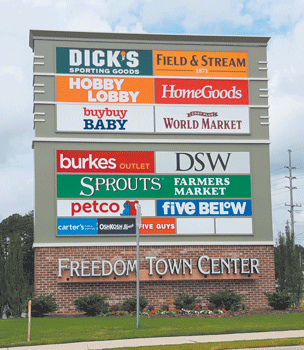 Fayetteville/Cumberland County property tax rates will likely remain stable in the foreseeable future. That is primarily because new commercial business construction is picking up much of the tab.
Fayetteville/Cumberland County property tax rates will likely remain stable in the foreseeable future. That is primarily because new commercial business construction is picking up much of the tab.
“The increases in values from new construction, renovations of existing properties and the natural growth in property values all are used to maintain a favorable tax rate,” said Fayetteville City Manager Doug Hewett. City and county government officials are holding the line on ad valorem tax rates for the fiscal year that begins July 1.
Data provided by the Cumberland County Tax Administration office indicates that the 2018 value of commercial property in Fayetteville increased by nearly $88 million over the year before, for a total of $4.123 billion. “Large projects like Freedom Town Center and its continued expansion are a boon to both shoppers and the city alike,” Hewett added.
There has also been significant business growth along the Skibo Road corridor between Cliffdale Road and Raeford Road. And Ramsey Street continues to yield economic growth.
The Cumberland County Tax Administration office establishes appraised property values, also known as market value, for all taxable property within the county. Market value has been defined by the U.S. Supreme Court as the sale price of real estate as agreed upon between a willing buyer and willing seller. Real property — land and the improvements — is valued on a countywide basis by the county tax assessor every eight years. In appraising real property, the assessor must consider the elements set forth in North Carolina General Statutes as to land — location, zoning, soil quality, mineral deposits, adaptability for different uses, past and future income, etc. — and buildings or other improvements, including types of construction, age, replacement cost, cost and adaptability for use.
Residential values also went up this past year over 2017, following property revaluation, by almost $62 million. Combined with business development, that’s a $150 million increase in the taxable value of the city’s commercial revenue base.
“The natural growth in tax revenues and the work city council and staff do to reduce costs also help us keep the cost of government much lower than our peer cities,” Hewett said.
Some would argue that Fayetteville has no peer cities as such. Virtually all other metropolitan areas of North Carolina rely on big business and industry for tax revenues and employment opportunities. The local Goodyear tire plant is big, employing nearly 3,000 well-paid workers. But, it stands alone. Fayetteville cannot claim a major business, bank or industry with its home office here.
As a bedroom community for Fort Bragg, Fayetteville’s economy relies on the retail and service sectors, which provide stability. Activities associated with the service sector in addition to retail and wholesale sales include transportation and distribution, restaurants, clerical services, media, tourism, insurance, banking and health care. In the U.S., about 80% of the labor force is employed in this sector. The median property tax in North Carolina is $1,209 per year for a home value of $155,500. Counties in North Carolina collect an average of 0.78% of a property’s assessed fair market value as property tax per year.
North Carolina has one of the lowest median property tax rates in the United States, with only 14 states collecting a lower median property tax than North Carolina.